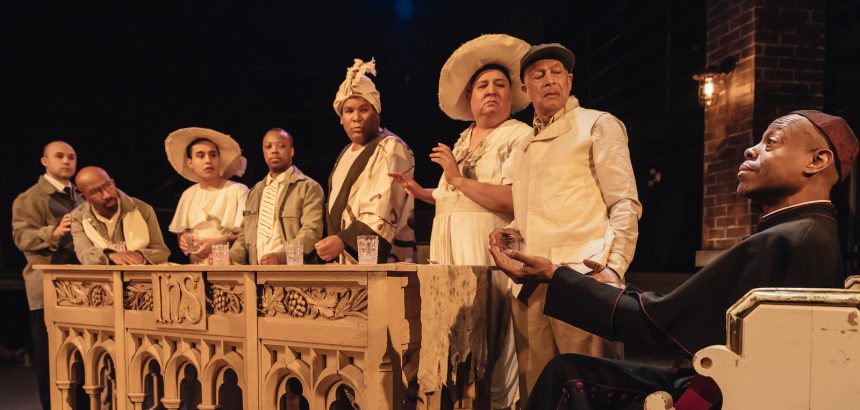When I first saw the full cast, in the opening scenes of Lilies; Or, The Revival of a Romantic Drama, I was able to see myself represented on stage. Watching Lillies / Les Feluettes as queer teen, I liked the story, but as with many queer films, I never saw myself reflected on screen. Queer media at the time primarily only cast actors for gay characters who were white, able-bodied, fit/athletic, cisgender dudes. Being a fat, brown, feminine First Nation person, I couldn’t see myself within these queer narratives. But on Saturday I did see parts of myself reflected in a cast and story on the same stage.
This production held such touching pieces of comfort and struggle between the lovers Vallier (Waawaate Fobister) and Simon (Tsholo Khalema). No matter the setting or cast, I feel that those scenes are universal for many queer people. The passion and longing to be with someone, knowing that getting caught creates the danger of being outed. There is also that inharmonious pain, when the freedom to be yourself is hindered with the depths of the homophobia and internalized homophobia of someone else.
This performance carries teachings of dishonesty and harbouring feelings of anger for the past. For every action creates reaction, and the ripple of events caused by others may not always be felt right away. Throughout the performance, I kept turning towards His Excellency Bishop Jean Bilodeau to witness his discomfort of the past returning to haunt him. Avoidance can only work for so long. Walter Borden, who plays the older Simon, depicts a soul full of loss and anguish. You shouldn’t hold onto yesterday if it impedes the advancement of tomorrow. But if you are incarcerated for a lifetime, yesterday might be all that you have left.
The play takes place in a prison in Canada 1952. There were moments in the play when I thought of the over representation of Indigenous and Black people within the criminal justice system. Then I remembered that the Canadian criminal justice system and others like it were never built for Indigenous, Black or people of colour. Canada markets itself as a melting pot of different cultures and people. But you still need one power to make the pot and one power decides who goes into and who comes out of that pot. Within the current social and political climate, it is important to learn from one another and to listen to each others’ stories. To find those similarities that begins to thread the foundation of understanding and awareness. There is enough violence in the world that we shouldn’t treat each with indifference, since there are so many who would rather not see us at all for our differences. And together we can begin to either stir that pot or pour it right over.
Overall, I took from this production of Lilies the importance of representation. What does it mean to see ourselves reflected, in different stage of someone else’s story? Moments of ourselves are revealed in a tender embrace of others. Our fears are shown in the vengefulness of those who are not like us. While hiding pieces of ourselves, we hurt those who love us. We lie so that we may not burden them with aspects of our souls that aren’t always understood. We cherish those helpers who affirm our journeys and needs. We become the victims of someone else’s pain. Eventually we must face the shadows of the past, stored within our attics and our memories. And with time channel our hurt towards hope in a creative way. In a good way.
Lilies production photo by Jeremy Mimnagh. Costume design by Joanna Yu, set design by Jay Havens, lighting design by Michelle Ramsay.


